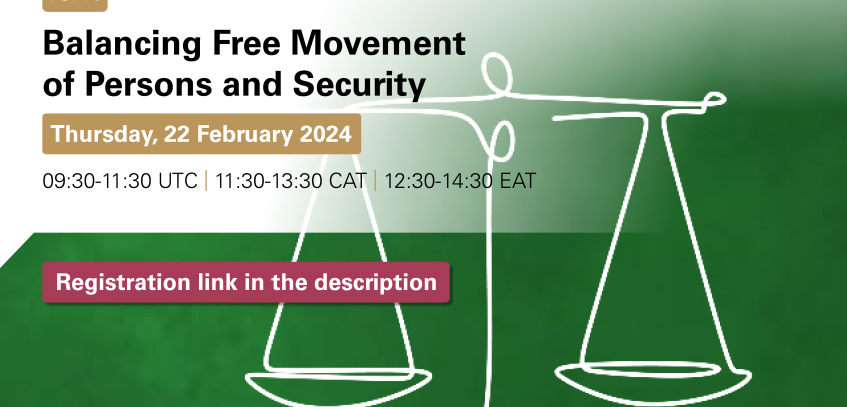The Economic, Social and Cultural Council (ECOSOCC) in collaboration with the Deutsche Gesellschaft für Internationale Zusammenarbeit (GIZ) organized and held the first Free Movement Protocol webinar on February 22, 2024. The webinar put together a panel of experts who led the conversation in exploring the topic, "Balancing Free Movement of Persons and Security.
The topic of balancing the free movement of persons and security is quite relevant, especially in the context of regional integration efforts and migration challenges faced by many countries and regions around the world.
ECOSOCC’s Trade and Industry Cluster Committee Chairperson, Ms. Isandra Ralaizanadraoto gave the opening remarks where she called on participants to offer constructive feedback towards the topic at hand stating, “What we decide today determines the future of security around immigration in Africa. Let us build an Africa that has zero borders in the end. Let us be guided by pan-Africanism in this quest."
The panel of experts shared from their diverse backgrounds and technical expertise working in migration-related fields. Ottilia Anna Maunganidze, Head of Special Projects at the Institute of Security Studies emphasized the need for the demystification of what free movement in Africa actually entails.
"Free movement is not unregulated travel. Africa is a young continent, so it is important to involve the youth in the decisions around popularization of the Free Movement Protocol. No conversation about migration can be had without talking about its associated security," she said.
Dr. Ahmed Bugre, a Senior Advisor Independent Consultant within the African Union Commission and an Executive Director of Foundation for Shelter and Support to Migrants (FSM), focused on some of the reasons that seem to come up against African Union Member States’ embracing of the Free Movement Protocol.
"Countries do not want insecurities in other countries to spill into their own by enabling free mobility of people across borders. Member states also seem to fear losing out on visa remittances whenever free movement across borders is raised. The African Union is in the process of identifying a champion to push the adoption of the FMP across the continent. There should also be a group of experts to do the same. The other idea would be to draw from the RECs' best practices regarding mobility of people," he shared.
Dr. Rhuks Ako, an Independent Consultant and former Senior Analyst for AU on Peace and Youth called for the need to empower the youth across the continent on the issue of the Free Movement Protocol.
He called for youth to be exposed to the knowledge and experiences about the FMP to enable them work with their peers and drive the FMP agenda on mobility and on the aspect of security.
Dr. Willie Eselebor, a researcher and consultant specializing in borders, migration, peace-building and conflict sensitivity, highlighted how the benefits from free movement, outweigh security concerns.
“Best practices from the RECs will show how easier mobility across borders benefit countries. Of most importance, let us engage with CSOs and the private sector because the decisions around free movement of people affect them harder. Let us also engage the operational officers that are to put the protocol into play. This will spur the ratification of the FMP across the continent," he explained.
Participants engaged the panel of experts in a question and answer session. The webinar explored the complex interplay between movement of people across the continent and its accompanying security challenges while identifying solutions and best practices drawn from RECs in trying to address the challenges therein.
The next Free Movement Protocol webinar will be held on April 25th , 2024, under the topic: "Achieving Free Movement of People and Labour: the Road to Implementation of the Free Movement Protocol."





